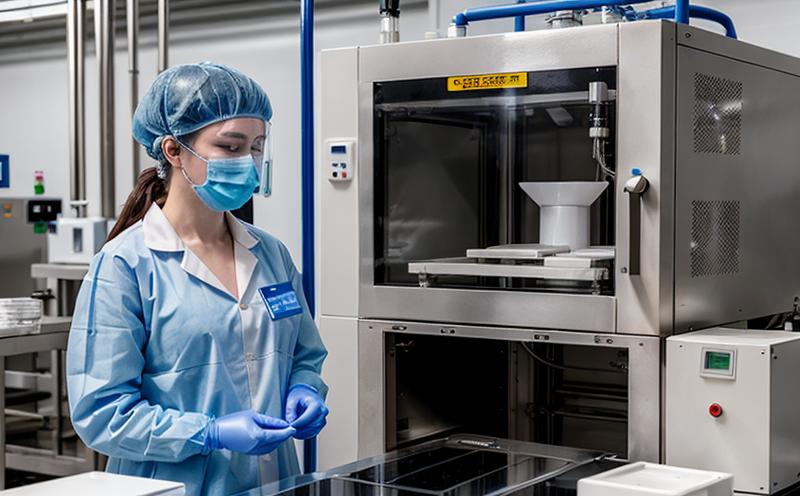GMP Cold Chain Qualification Testing
In the pharmaceutical industry, the adherence to Good Manufacturing Practice (GMP) is critical for ensuring product quality and safety. The cold chain plays a pivotal role in maintaining the stability of temperature-sensitive products during storage and transportation. Cold chain qualification testing ensures that pharmaceutical products remain within specified temperature ranges throughout their lifecycle, from manufacturing to distribution.
The importance of this cannot be overstated. Temperature fluctuations can lead to degradation or loss of efficacy of drug substances and formulations. Regulatory bodies like the FDA and EMA mandate stringent controls over cold chain management to safeguard product integrity.
Cold chain qualification testing involves a series of comprehensive checks on refrigerated transport vehicles, storage facilities, and distribution centers. This ensures that all equipment and processes meet the necessary standards for maintaining controlled temperatures. Our laboratory specializes in conducting these tests using industry-recognized methodologies such as ISO 17025 and ICH guidelines.
The testing process typically involves:
- Temperature mapping of refrigerated vehicles
- Detailed documentation of temperature fluctuations during transport
- Validation of storage facilities against specified temperature ranges
- Data analysis to ensure compliance with predefined limits
Our team uses advanced monitoring systems and sensors to gather precise data on temperature variations. This information is then analyzed to identify any potential risks or deviations from the required specifications.
The results of these tests are crucial for obtaining regulatory approval and ensuring that pharmaceutical products meet stringent quality standards. By leveraging our expertise in GMP compliance testing, you can rest assured that your cold chain operations are up to industry benchmarks.
Why It Matters
Cold chain qualification testing is essential for maintaining the integrity of temperature-sensitive pharmaceuticals. The implications of failing to meet these stringent requirements can be severe:
- Product Degradation: Temperature excursions can lead to product degradation, potentially rendering medications ineffective or unsafe.
- Regulatory Penalties: Non-compliance with GMP regulations may result in fines and other penalties from regulatory bodies.
- Patient Safety: Ensuring that products are stored and transported at the correct temperature is crucial for patient safety and efficacy.
The FDA's Guidance for Industry: Qualified Person (QP) Responsibilities in Relation to Temperature Control of Pharmaceutical Products emphasizes the importance of cold chain management. Similarly, the EMA provides guidelines on temperature control and monitoring during transport.
Our laboratory's expertise in this area ensures that your operations are compliant with international standards. By partnering with us, you can mitigate risks associated with non-compliance and ensure a seamless supply chain.
Industry Applications
| Application | Description |
|---|---|
| Vaccine Distribution | Vaccines are highly sensitive to temperature changes. Our testing ensures that vaccines remain stable during transport and storage. |
| Tumor Necrosis Factor (TNF) Inhibitors | These biologics require stringent cold chain management to maintain their efficacy. |
| Monovalent Vaccines | Cold chain validation is crucial for the safe and effective distribution of these vaccines. |
| Antibiotics | The stability of antibiotics can be compromised by temperature excursions, making cold chain testing vital. |
| Blood Products | Blood products must be stored at specific temperatures to ensure their integrity and safety. |
| Insulin Preparations | The stability of insulin is dependent on maintaining the correct temperature during transportation and storage. |
Cold chain qualification testing is a critical component of GMP compliance, ensuring that all pharmaceutical products are handled according to stringent standards. Our laboratory offers comprehensive testing services for various applications, including those listed above.
Use Cases and Application Examples
Cold chain qualification testing is applicable across multiple scenarios within the pharmaceutical industry:
- New Product Launches: Ensuring that new products meet cold chain requirements before market release.
- Supply Chain Optimization: Identifying potential inefficiencies in transport and storage processes.
- Audit Preparation: Preparing for inspections by regulatory bodies to demonstrate compliance with GMP standards.
- New Facility Validation: Validating new cold storage facilities or refrigerated vehicles against specified temperature ranges.
We have successfully conducted testing for numerous pharmaceutical companies, including multinational corporations and smaller biotech firms. Our clients rely on our expertise to ensure that their products are handled under the strictest conditions possible.
For instance, one of our recent projects involved validating a new refrigerated truck for the transportation of monoclonal antibodies. The test results showed that the vehicle met all required temperature specifications, ensuring safe transport during various weather conditions.





